QuestionHi, I had two female dumbo rats named Sable and Periwinkle that were just over two years old. Both had multiple mammary tumors that had been growing for the past 5 months or so, but I was unable to get them attended to sooner, for financial reasons. I took Sable in last week, as her condition was the most serious of the two: her tumor was large and soft, though she carried it well, because she was fat. The morning I took her in, she was alert and frisky, even stealing crackers away from her cagemate. She went through the surgery okay, though the vet told me that the tumor was full of puss. However, within an hour after the surgery, after she'd come to, she passed away in the incubator. This surprised me, because I've had rats for the last 7 years, and thought the surgery was pretty routine. The vet said that due to the puss, she may have been septic, but she was so alert and active up until the surgery, it didn't seem likely to me.
Then, this week, I brought her cagemate, Periwinkle, in for the same surgery. I was concerned about the vet's ability, but she seemed capable and caring, and I knew it had to be done. Plus, we live in a small town, and she's the only exotic vet. Periwinkle's tumors were smaller and more solid, requiring smaller incisions; she had 2 large ones, and a smaller one developing. She also came through the surgery okay, but then I got a call just a few minutes ago that she had also passed away in the incubator -- about 3 hours after surgery. This time, the vet had no explanation. She said they'd administered mimimal amounts of the anesthesia and the anti-pain medication, to play things safe. She only suggested that maybe by waiting so long, that the once-benign tumors might have metasticized and affected the lungs, making them less tolerant of the anesthesia. She also claims to have worked with rats extensively and has been practicing as a vet for about 6 years.
She waived the charges for Periwinkle, and has sent both rats off to a lab for a necroscopy.
My question is: how common is it for otherwise healthy rats to pass away after tumor surgery? I've read that waiting too long can cause the tumors to become involved with their arteries, but have also read that with older rats, that sometimes it's best just to let them be. The vet said that there was a minimum of bleeding. What could have caused them to pass away like this? Do you think this indicates any possible negligence on the part of the vet? Should I think twice about going back to her in the future?
AnswerWow! I am just floored. I am so sorry for your loss. Really sorry.
Back to back like this is devastating.
As for my thoughts, I can only offer my honest opinion and remember, its only my opinion and have no proof at all but I will go by the experience I have with rats. Although I am not a vet, I have had alot of experience with rats and have been through alot of illnesses with them.
I would like you to check over the URL I am going to give you. Find your location and go through all of the vets names. See if your vets name is there. If she isnt, she is NOT an exotic veterinarian and if she is passing herself off as one, this is highly illegal.
http://www.aemv.org/vetlist.cfm
Second, I have only lost one rat post op. It was the vets fault and he died three days later from internal bleeding. I have never lost another rat during or after surgery and I have only see a few cases of this at the clinics and these surgeries were high risk so it was already a high mortality rate. Last year, I decided to go ahead with tumor surgery on my 3 year old rat. She was under for 90 minutes. The tumors were very vascular and she lost blood which we quickly replaced. She did very very well post op and lived to be a few months shy of her 4th birthday.
Do you know the name of the anesthesia that was used on the girls?
Also, do you know the method used to keep the rat warm both during and after surgery? Often a heated surgical table is used. The rats body temp drops very fast during and after surgery and they need kept very warm for many hours afterwards in order not to suffer from hypothermia.
I am curious about the anesthesia used. It would say on the invoice from the other rat that you lost. If you have it, check it out and see if it gives the name of the anesthesia used.
You asked if I think you should continue taking your rats to her and I say NO. See if there are any exotic vets on the AEMV site that you can use, but I would absolutely never let her touch my rats again. Losing one rat is bad enough but two? I am curious also, did the vet send out the girls to a pathology lab
Do you know if they did any post op blood work, testing liver and kidney functions along with heart?
BTW they were NOT too old for the surgery. 18 to 24 months is the prime age for mammary tumors to manifest. They are fueled by high estrogen levels. This is the average age for them to show up and the average age for them to be removed.
I cant say what the cause of death was in your girls, but I am thinking it was either heart or organ failure from improper use of anesthesia, hypothermia if the rat was not kept warm properly, or bleeding due to the vets inability to clamp off any major blood vessels that may have been bleeding. Tumors become vascular the bigger they get, but even the small ones can be risky if they are located near any major arteries, esp if they are in the neck, chest and throat area too.
If you want, you can give me her name and make the post PRIVATE and I can check her credentials.
Oh, btw, the vet should have used isoflurane or sevoflurane. DO NOT tell the vet this, but instead, ask to find out what was used. Even if she did use one of these gases, that doesnt mean they were dispensed properly.
Also, its good that a vet that is doing surgery on a small mammal wear goggles that help magnify the surgical area and also tiny implements to be able to fit into small spots. A vet that is not truly dedicated to exotics doesn't even have these sort of things available to them because its not cost effective. They treat more dogs and cats every day and don't invest in the proper implements needed to accommodate the small mammal. I know its hard to find an exotic vet in a small town but the vet that offers to see exotics needs to understand they can cause more harm than good if they are truly not prepared to care for them. Sometimes these vets cause more harm than good.
I hate that your rats both passed this way. I would like to say that hopefully the necropsy will show they passed from natural causes, but the chances for that to occur two times in a row like that bothers me. Blood work should have been done prior to surgery and a thorough exam of the heart etc....done before even putting the rat under.
Please let me know about the things I asked.
Hang in there!
Sandy

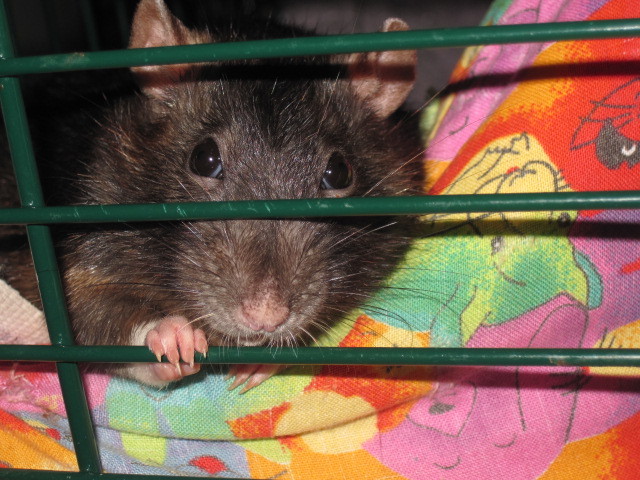 When to say goodbye?
Question
Ebony
My rat Ebony is 2 years and 8 months old
When to say goodbye?
Question
Ebony
My rat Ebony is 2 years and 8 months old
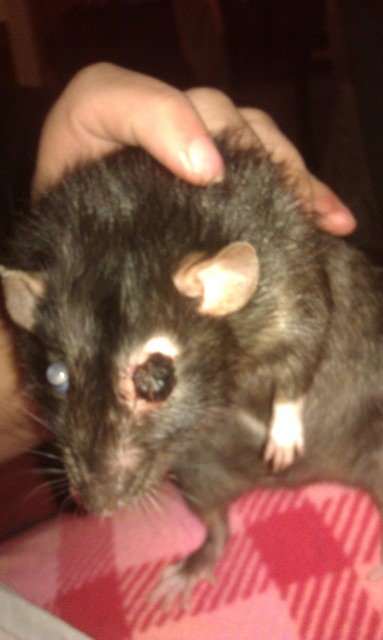 !!SEVERE eye infection
Question
Jenkins
I have 2 male rats who around a
!!SEVERE eye infection
Question
Jenkins
I have 2 male rats who around a
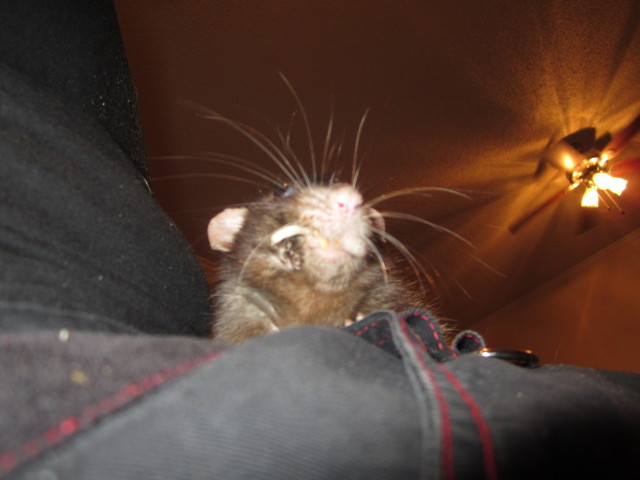 Overgrown Teeth
QuestionDarkWings teeth
QUESTION: My Dumbo Rat,
Overgrown Teeth
QuestionDarkWings teeth
QUESTION: My Dumbo Rat,
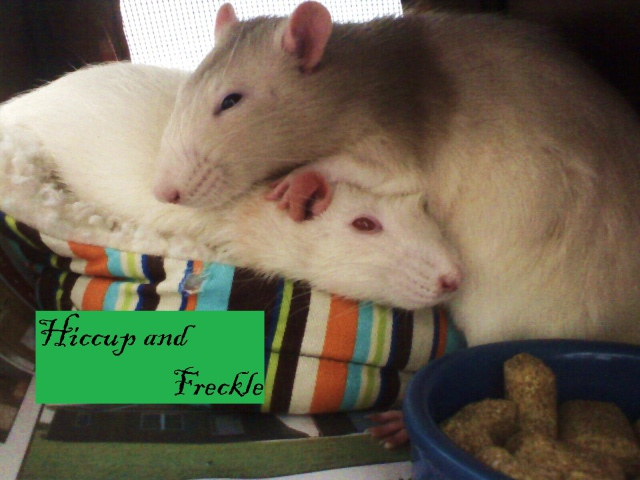 Rat Behavior
QuestionFreckle (bottom) and H
QUESTION: Hello,
Rat Behavior
QuestionFreckle (bottom) and H
QUESTION: Hello,
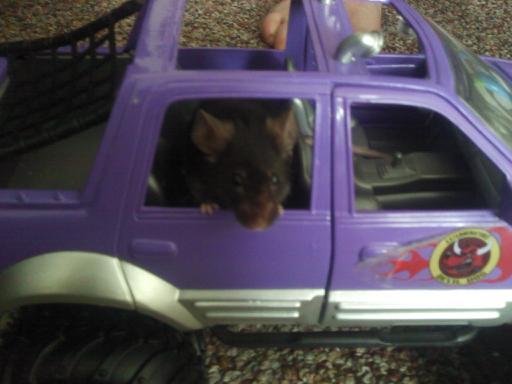 Do you have any advise for a mouse?
Question
Miss Honey Bun
I know mice and rats are two se
Do you have any advise for a mouse?
Question
Miss Honey Bun
I know mice and rats are two se